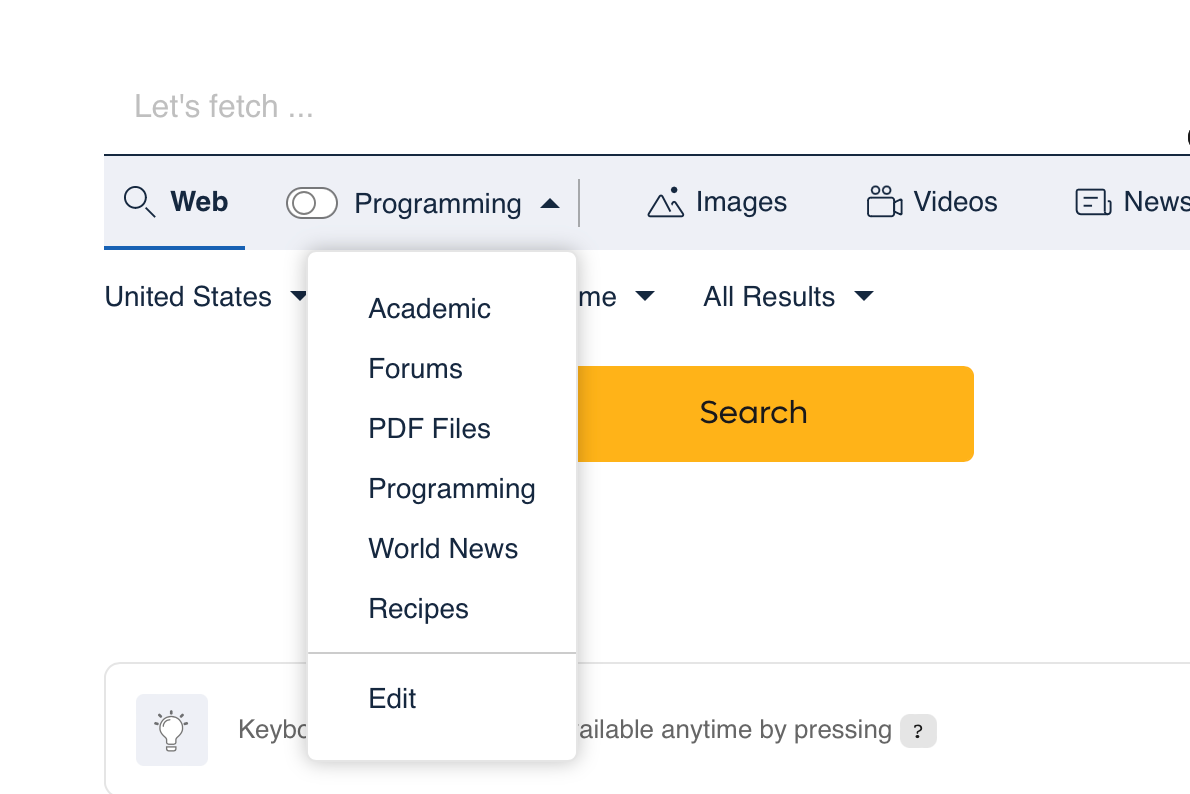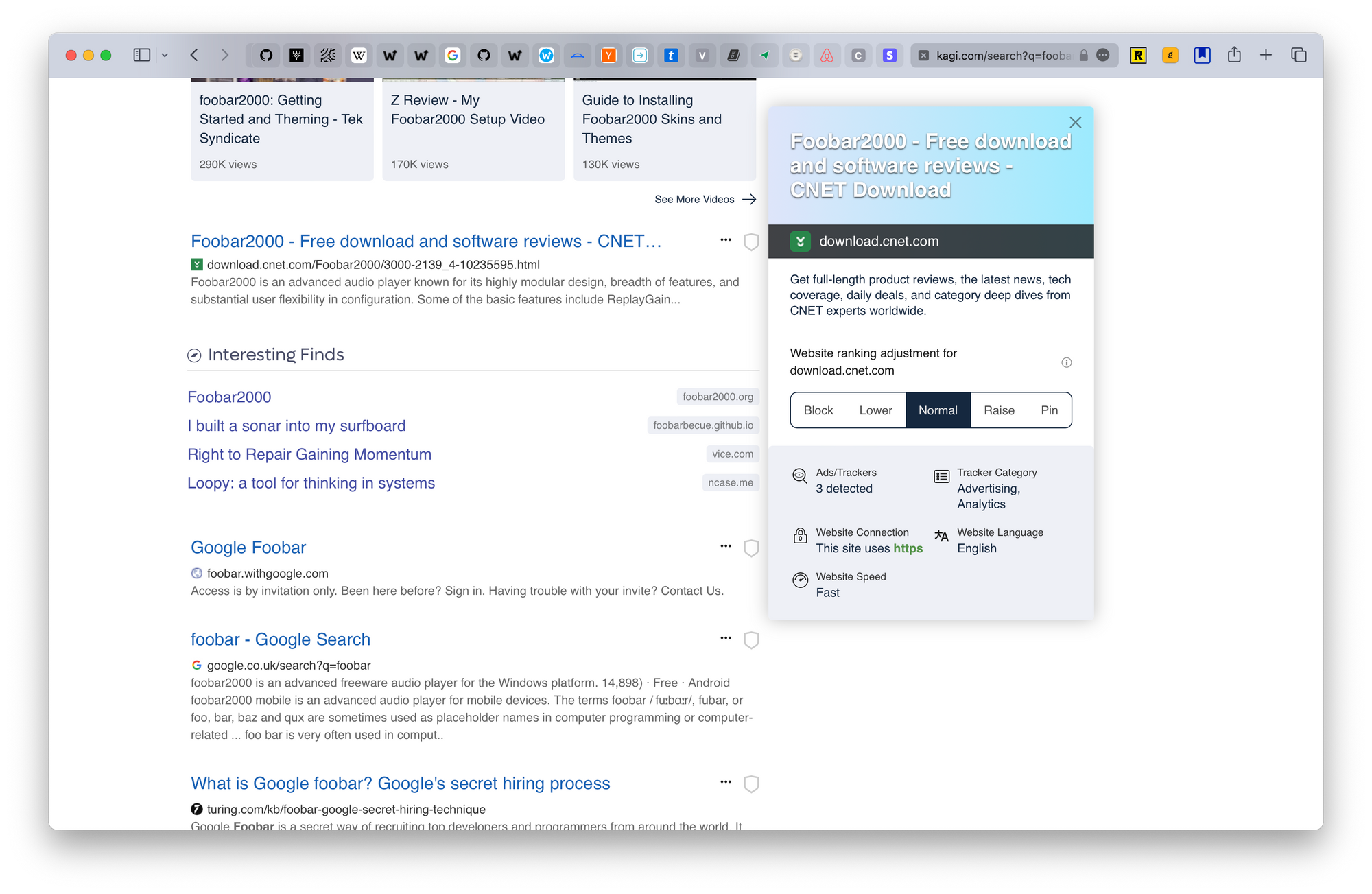Considering Kagi
How It Started
I found myself often frustrated with the search results and experience on Google recently. I use my keyboard for everything on my computer but it forced me to use the mouse. I wanted to search for a specific showtime for an upcoming concert but the entire screen was filled with ads and other ‘summarization’ features that prevented me from finding a link quickly. Search results were often to spam websites. Clicking on links usually triggered a redirect to the site (from Google) that had a high latency at the least convenient times.
Bing isn’t any better - it’s basically copied every decision made by Google, as far as I can tell.
So, I started looking for search alternatives. I had used DuckDuckGo in the past but wanted to consider others. I found some nice comparisons of the current search landscape and settled on trying Kagi because it seemed like the best set of features. It’s also the most expensive option at $10/mo so I set a reminder to re-evaluate it for myself at the 30-day mark. Let’s check in.
Features
Search Index
I really do love the fact that the results on Kagi seem to be better than those on Google and DuckDuckGo. Kagi uses the search indexes of Google and Bing as well as their own indexes, mashing them all up together and re-ranking things based on their own logic as well as the customizations you provide for your account. I consistently got to the right result faster or found a more interesting blog article through Kagi.
Speed
Searching on Kagi is fast. Faster than on Google and DuckDuckGo most of the time. I didn’t quite notice this difference until I started switching back to the other providers, but it was snappy.
However, I think I will go back to not noticing the extra 50-100ms per search once I’ve been away from it for a while, so currently I don’t think it is worth the $10/mo. But if things get worse on the big providers in the future, this might be a reason to come back.
Accessibility & Navigation
I cannot believe that Google doesn’t support keyboard navigation of its site in 2023, but here we are. I really loved using the keyboard navigation of Kagi - moving up and down between results with keystrokes, opening items, etc.
However, this functionality is also offered by DuckDuckGo, so it is a basic expectation feature, not differentiating. Also, it was slightly buggy on Kagi - at times moving through results required a page refresh to get it working.

Custom Searches (Lenses)
Kagi provides a set of customized search types for you to use, and allows you to create as many of your own custom searches as you like. They’re basically macros for appending site:foo and extension:bar parameters into your search so that you only get certain results back.
I didn’t ever use these (or the other version of this: boosting or lowering certain domains in search results), but I could see it being very useful for a researcher. I currently do the same thing but with Alfred/Raycast macros that append this kind of thing before launching me into the search experience. For example, I have macros for searching Ruby docs, Rails docs, JavaScript docs, and others.

Custom Display
I do quite enjoy customizing the look and feel of my search results pages, so I used this feature. Coming to search results and having them super easy to read and also having them feel a little bit like they were found ‘just for you’ is nice.
It is, however, also available in DuckDuckGo, where it’s implemented a bit better I think (for options to choose from).
Staying or Leaving
For now, $10/mo ($0.20/search!) is too rich for my blood to keep using Kagi as my main search engine. I’ll be switching over to DuckDuckGo for a month to try that option. If I see significantly worse results there, maybe I’ll switch back.
I do love the fact that there are more options coming onto the market to eat Google’s lunch. I think it’s ripe for disruption and more specialized options should be explored.
Reference
| ← Previous | Next → |
| Note on How Io_uring and eBPF Will Revolutionize Programming in Linux via Glauber Costa | Good First Issues Are Gifts |